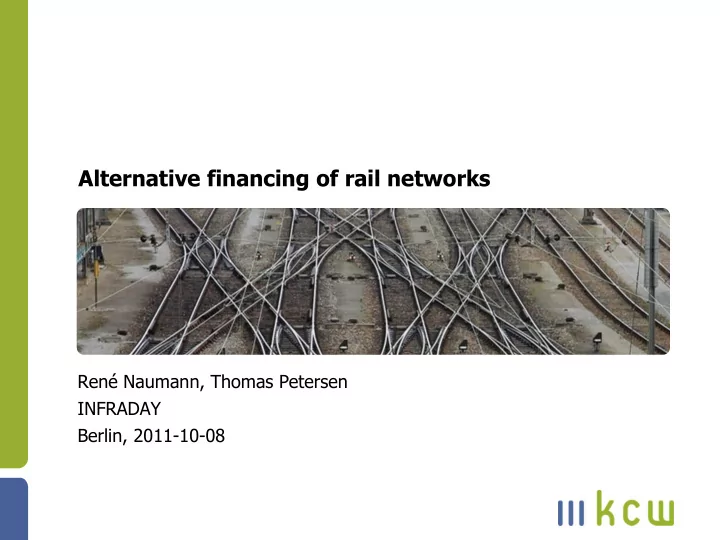

Alternative financing of rail networks René Naumann, Thomas Petersen INFRADAY Berlin, 2011-10-08
starting point focus of this presentation state-owned rail infrastructure in Germany operator: DB AG – separated into different companies (DB Netz, DB Station & Service) focus on costs of infrastructure provision, such as operation and maintenance of infrastructure reinvest (depreciation) financing administration, profit, etc. financing of infrastructure provision via track charges station charges contract regimes to impose efficiency 2 KCW GmbH
starting point rail infrastructure – a natural monopoly essential facility price non-contestable market p M 2nd best price economies of scale demand p E 1st best price (Pareto optimum) non-regarded demand M p M average costs E p E marginal costs output q M q E Deutsche Bahn‘s charge -setting is comparable to monopolist‘s calculation 3 KCW GmbH
starting point current design of DB infrastructure charges infrastructure infrastructure provision costs provision costs financing costs number of use depreciation IM calculation 20 € administration, profit 20 € 20 € maintenance 20 € operation 20 € 100 € additional use is charged by same extent windfall profits 4 KCW GmbH
demand different market segments market charges price elasticity market structure segment of demand SPFV Very low long-distance (integrated RU) traffic SPNV regional traffic ~ 0 (subsidised by Federal States) reasonable SGV (affected by freight traffic economic cycles) 5 KCW GmbH
vertical integration DB some remarks DB divisions yield different profits (EBIT/turnover 2010) long-distance traffic RU (DB Fernverkehr) ~ 3% regional traffic RUs (DB Regio) ~ 9% freight RU DB Schenker Rail ~ 1% DB Schenker Logistics ~ 2% infrastructure track – DB Netz ~ 13% stations – DB Station&Service ~ 20% infrastructure yield highest profits loss of market shares in transport segments can be easily compensated by infrastructure‘s monopoly EU law requires independent infrastructure companies 6 KCW GmbH
infrastructure charges draining the budget development of regional transport‘s infrastructure charges in relation to the budget constraint by the Federal States 135 2000-2010 130 +32,8% 125 2000-2010 +24,6% 120 115 110 2000-2010 +3,9% 105 100 95 2000 2001 2002 2003 2004 2005 2006 2007 2008 2009 2010 Development Budget (RegG) (Index) Developmemt track charges (Index) Development station charges (Index) 7 KCW GmbH
natural monopoly of German rail (infrastructure) market comprehension non-constable market public protection of state-owned IM (no competition of the track) vertically integrated company – Infrastructure and rail services discriminatory potential (proved by FNA and law courts) market barrier for (intramodal) competition on the track indirect cross-funding between subsidiaries X-efficiency proved by few benchmarks (stations) track access charges without any incentives to increase demand worsening of rail‘s intermodal competitiveness but: currently no evaluation of productivity by FNA complains about insufficient quality of track and stations 8 KCW GmbH
reform main tackles 1. how to implement marginal cost pricing ? price demand M p M average costs E p E marginal costs output q M q E 2. how to induce steering mechanisms for price and quality measures effectively? 9 KCW GmbH
side-step contractural agreements contracts on service-levels and financing-levels (LuFV) incentive-based contract on provision of rail infrastructure between public body and IM appropriate output (quality and quantity) specificaton, e.g. average age of assets controlling instruments output level defines amount of fundings penalty and sanction system LuFV Bund – DB since 2009, regarding maintenance of rail infrastructure, but inadequate output measures (productivity) and controlling instruments sanctioning virtually impossible 10 KCW GmbH
reform (1) splitting cost basis splitting provision costs into fix costs and variable costs infrastructure fix costs variable costs provision costs (marginal costs) financing costs 100% 0% depreciation 100% 0% administration, profit ~100% ~0% maintenance ~80% ~20% operation ~0% ~100% 11 KCW GmbH
reform (2) splitting responsibilities infrastructure 1. for long-distance, agglomeration, and freight traffic (main track) obligated by constitution: Bund operation by state-owned IM (DB Netz) 2. for regional traffic only (regional tracks) obligation: Bund, execution: Federal States reason: infrastructure is re- financend mainly by Federal States‘ subsidies Federal States choose IM‘s for operation of regional tracks inducing competition in monopolistic market establish benchmarking for infrastructure provision costs principle of subsidiarity 12 KCW GmbH
reform (3) contractural agreement – main track contract on service-levels and financing-levels fix costs between Bund and state-owned IM financing costs Bund compensates fix costs directly fix costs seperated from infrastruture charges depreciation incentive regulation of costs ( productivity ) administration, profit IM‘s profit depends on level of quality and costs maintenance infrastructure-charging between state-owned IM and RU on basis of marginal costs (mainly operational costs) inducing additional demand problem: price differentiation between market segments minimisation of the natural monopoly‘s effects 13 KCW GmbH
reform (4) contractural agreements – regional tracks Bund / DB PSC Regional Rail PSC Regional Rail contractual agreement with IM devolution of regional responsibility for rail infrastructure regional tracks PSC plus additionally: contractual agreement with IM (vertical provider) disposition of funds x years Federal States/PTA operation modell contractual agreement as for main track – quantity and quality incentive regulation by benchmarking of similiar networks possible 14 KCW GmbH
reform (5) contractural agreements – main and regional tracks (scheme) public funding Bund Federal States responsibility contractual agreement public funding PTA access charges IM IM IM RU RU RU 15 KCW GmbH
thank you for your attention! contact René Naumann KCW GmbH Berlin KCW GmbH Fon: +49 (0) 30/40 81 768 – 52 Büro Berlin Fax: +49 (0) 30/40 81 768 – 61 Bernburger Str. 27 Mail: naumann@kcw-online.de D-10963 Berlin Web: www.kcw-online.de 16 KCW GmbH
Recommend
More recommend